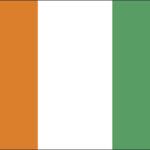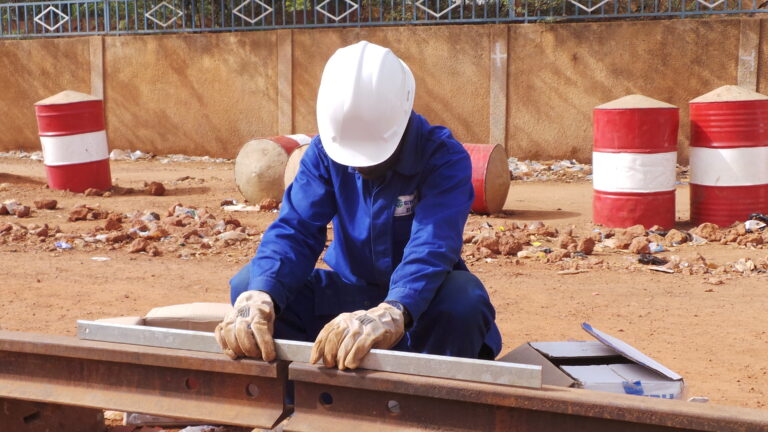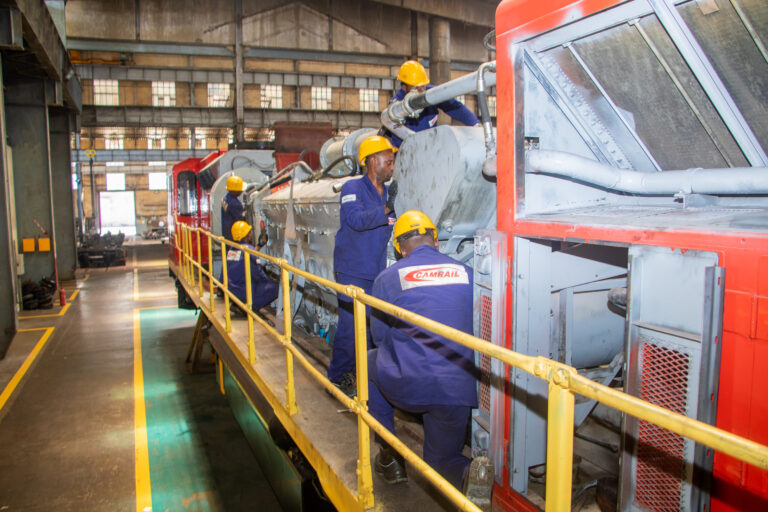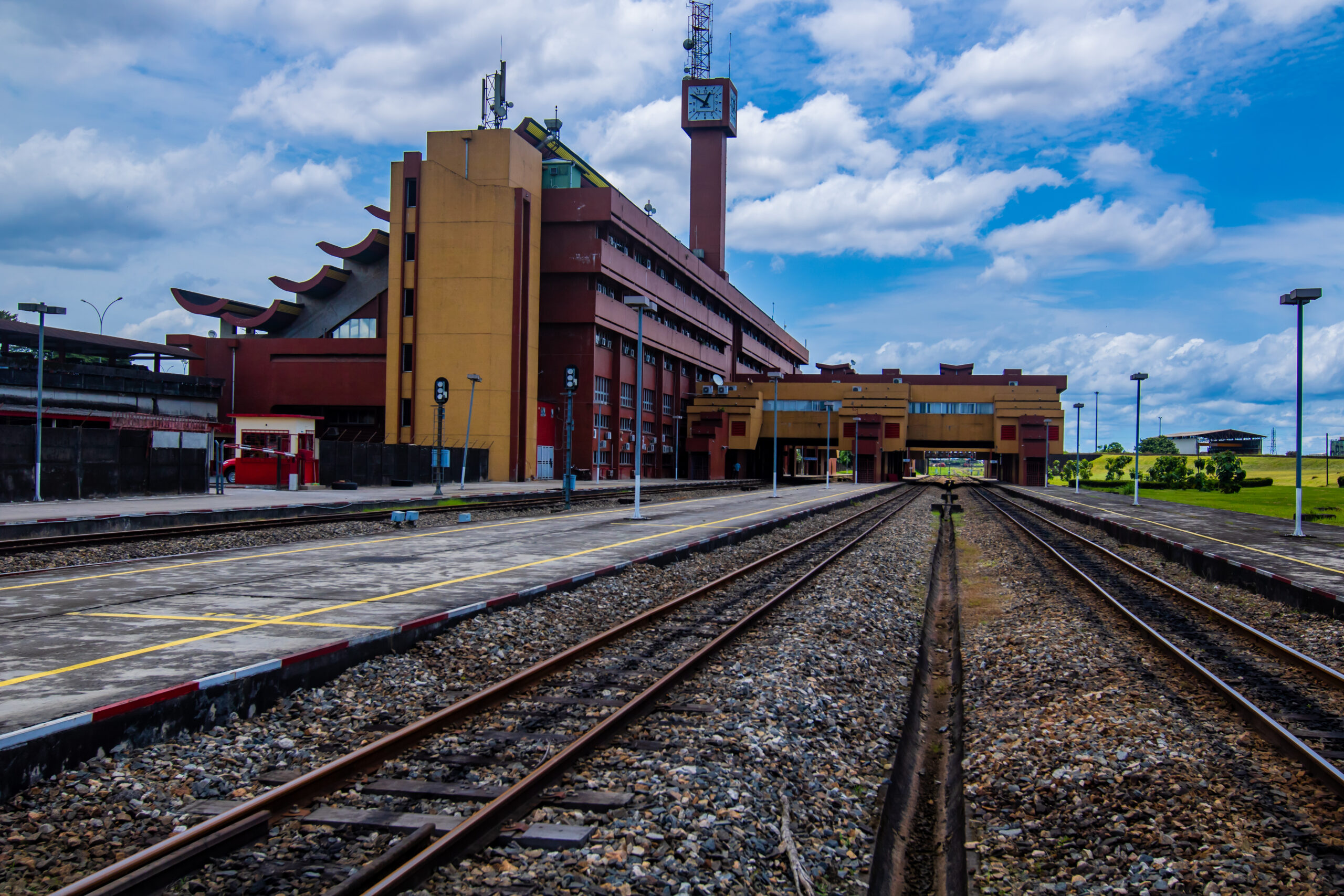Africa Global Logistics operates rail concessions that transport the continent’s oil, container, building materials and everyday consumer goods supplies. We also facilitate agricultural product exports and operate intercity and long distance passenger services.
We firmly believe that rail has a vital role to play in supporting local economies and ensuring environmental sustainability.
Africa Global Logistics operates two rail concessions – SITARAIL, the network linking up Ivory Coast and Burkina Faso (operated since 1995) and CAMRAIL, Cameroon’s rail network (operated since 1999).
 Burkina Faso
Burkina Faso
 Ivory Coast
Ivory Coast


Transporting around 1 million tonnes of freight per year 1 million tonnes of freight per year.
Its main line of business is supplying containers of oil, clinker, foodstuffs, fertiliser and construction materials to the cities of Bobo-Dioulasso and Ouagadougou in Burkina Faso.
On the return journeys, Sitarail transports Burkinabe cotton crops and livestock destined for export as well as local produce from landlocked areas.
Its network has branch lines with private sidings for around twenty companies and manufacturers in both countries for door-to-door deliveries.
The company works with more than 200 businesses and local subcontractors, providing an indirect livelihood to thousands of people.
granted
for 59 stations
in 2021
transported annually
 Douala corridor
Douala corridor(Cameroon)


Bangui (CAR)


The Camrail network comprises two lines.
The first of which - the Trans-Cameroon Railway linking Douala and Ngaoundéré - is 885 km long.
The second section of the network, between Douala and Mbanga and onwards to Kumba, is around 100 km long and is not in use. Camrail transports passengers along the Douala-Yaoundé, Yaoundé-Bélabo and Bélabo-Ngaoundéré sections of its network.
It also transports cargo for the national market from the Port of Douala, including oil destined for the three main depots at :
- Yaoundé,
- Bélabo,
- Ngaoundéré.
Consumer goods for areas accessible by rail with links between Douala and Yaoundé in the north and east of Cameroon ; and domestic primary sector products for export, such as :
- cotton fibre,
- logs,
- lumber.
Our AGL subsidiary also serves the Douala-Chad and Douala-Bangui corridors with a combination of rail and road transport.
granted
for 38 stations
in 2021
transported annually
** in Cameroon over the past five years
AGL’s networks have direct lines to some customer facilities in the form of private sidings, as well as to dry ports which serve the rail-road transport solution.
AGL fulfils passenger service duties via our two rail concessions.
We run intercity rail services (the Douala to Yaoundé or Yaoundé to Ngaoundéré Express) and so-called Omnibus train services (for transporting essential supplies to local populations). We also run international passenger services between the Ivory Coast and Burkina Faso on the Abidjan-Ouagadougou rail network.
With the suspension of international travel imposed by several West African states – including Burkina Faso and Ivory Coast – in March 2020 due to COVID-19, Sitarail was forced to suspend its passenger service between the two countries.

served
- First class
- Economy class
- Bar and restaurant

served
- Sleeper coaches
- First class
- Economy class
- Bar and restaurant
AGL is a major rail concessions operator on the African continent.
The company has acquired extensive expertise over the years. The railway training centres operated by AGL have become regional centres of excellence and models for transferring skills across the continent.
Modernisation of rail infrastructure
AGL is working in partnership with the concession-granting States to maintain and upgrade railway infrastructure.
We have set up multi-year programmes to replace :
- worn sections of track
- repair engineering structures
- upgrade signalling
- improve stations and passenger facilities.
These programmes also include the purchase of heavy maintenance and logistics equipment such as tampers, track inspection trolleys, road-rail vehicles and track maintenance tools.

Rolling stock maintenance
Our technical experts maintain, overhaul and repair rolling stock on both of our networks, including locomotives, wagons, passenger coaches and track maintenance and servicing equipment. They also service machine-tools and industrial equipment in the workshops.
These maintenance activities are carried out in AGL’s 10 technical and industrial depots, considered to be centres of technical excellence, ensuring that we are continuously improving the capacities of the networks we operate.

Sitarail and Camrail are leading the way in decarbonising transport in Western and Central Africa thanks to the modernisation of their rail equipment and infrastructure.
Both of AGL’s rail networks are helping to prevent CO2 emissions that would otherwise have been produced by road freight each year, thereby considerably reducing total carbon emissions in the countries they serve. Rail freight also helps to alleviate traffic congestion, using dedicated lines which significantly cut wait times for goods leaving ports and cities.
At AGL, we are committed to ensuring we use modern, fuel-efficient equipment which emits less CO2. Our proximity policy set up to protect populations living near railway lines is testament to this commitment.
